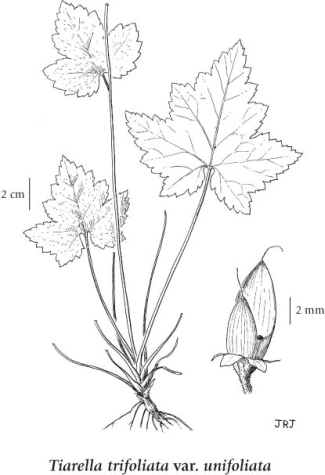Tiarella trifoliata var. unifoliata L. (Hook.) Kurtz
one-leaved foamflower (oneleaf foamflower)
Saxifragaceae (Saxifrage family)
Introduction to Vascular Plants
one-leaved foamflower (oneleaf foamflower)
Saxifragaceae (Saxifrage family)
Introduction to Vascular Plants
Map click to expand contents
Distribution of Tiarella trifoliata var. unifoliata
Click here to view the full interactive map and legend
Species Information click to expand contents
General:
Perennial herb from scaly rhizomes; flowering stems 20-50 cm tall, with a few leaves, glandular-hairy above.
Leaves:
Basal leaves heart-shaped, 3-12 cm wide, about as long, simple and shallowly to deeply 3- to 5-lobed or compound with 3 stalked leaflets that are lobed or deeply cleft, almost to the base, toothed, hairy and usually glandular, the stalks longer than blades, stipules about 1 cm long; stem leaves similar to the basal, 2 or 3, reduced; stipules to 1 mm long.
Flowers:
Inflorescence a narrow, many-flowered, terminal cluster, up to 15 cm long, densely glandular-hairy; petals 3-4 mm long, thread-like; calyces bell-shaped, 1.5-2.5 mm long, glandular-hairy, hypanthium bell-shaped, free of ovary, lobed 1/2 to 2/3 length, lobes irregular, the upper lobe largest; stamens 10.
Fruits:
Capsules, borne horizontally, one valve 3-5 mm long, the other 7-10 mm long; seeds blackish, about 1.5 mm long, shining, nearly smooth.
Notes:
Three infraspecific taxa have been recognized. These taxa are widely sympatric but var. trifoliata generally occurs at lower elevations (up to 650 m), while var. unifoliata generally occurs above 650 m. Variety laciniata is a hybrid between the latter two and occurs frequently on Vancouver Island and sporadically on the mainland.
1. Leaves simple, shallowly to deeply 3- to 5-lobed........... var. unifoliata (Hook.) Kurtz1.
1. Leaves compound, with 3 stalked leaflets.
2. Leaflets lobed............. var. trifoliata
2. Leaflets deeply cleft, almost to the base............. var. laciniata (Hook.) Wheelock
Illustration click to expand contents

If more than one illustration is available for a species (e.g., separate illustrations were provided for two subspecies) then links to the separate images will be provided below. Note that individual subspecies or varietal illustrations are not always available.
Illustration Source: The Illustrated Flora of British Columbia
Ecology click to expand contents
Ecological Framework for Tiarella trifoliata var. unifoliata
The table below shows the species-specific information calculated from
original data (BEC database) provided by the BC Ministry of Forests and Range.
(Updated August, 2013)
The table below shows the species-specific information calculated from
original data (BEC database) provided by the BC Ministry of Forests and Range.
(Updated August, 2013)
| Site Information |
Value / Class |
||
|
Avg |
Min |
Max |
|
| Elevation
(metres) |
1183 | 0 | 2750 |
| Slope
Gradient (%) |
22 | 0 | 145 |
|
Aspect (degrees) |
340 | 0 | 360 |
| Soil
Moisture Regime (SMR) [0 - very xeric; 4 - mesic; 8 - hydric] |
4 | 0 | 8 |
| Modal
Nutrient Regime
Class |
C | ||
| #
of field plots species was recorded in: |
7431 | ||
| Modal
BEC Zone Class |
ESSF | ||
|
All BEC Zones (# of stations/zone) species was recorded in |
BWBS(1), CDF(1), CWH(646), ESSF(2776), ICH(2563), IDF(85), MH(151), MS(284), PP(1), SBPS(4), SBS(586), SWB(1) | ||
|
Source:
Klinkenberg 2013
|
|||
Habitat and Range click to expand contents
Moist forests, meadows and streambanks in the lowland and montane to subalpine zones; common throughout BC south of 58degreeN; N to the Aleutian Islands and S AK, E to AB and S to MT, ID and CA.
Status Information click to expand contents
| Scientific Name | Origin Status | Provincial Status | BC List (Red Blue List) | COSEWIC |
|---|---|---|---|---|
| Tiarella trifoliata var. laciniata | Native | S5 | Yellow | Not Listed |
| Tiarella trifoliata var. trifoliata | Native | S5 | Yellow | Not Listed |
| Tiarella trifoliata var. unifoliata | Native | S5 | Yellow | Not Listed |
BC Ministry of Environment: BC Species and Ecosystems Explorer.
Synonyms click to expand contents
Synonyms and Alternate Names:
Tiarella trifoliata subsp. unifoliata (Hook.) Kern
Tiarella unifoliata Hook.